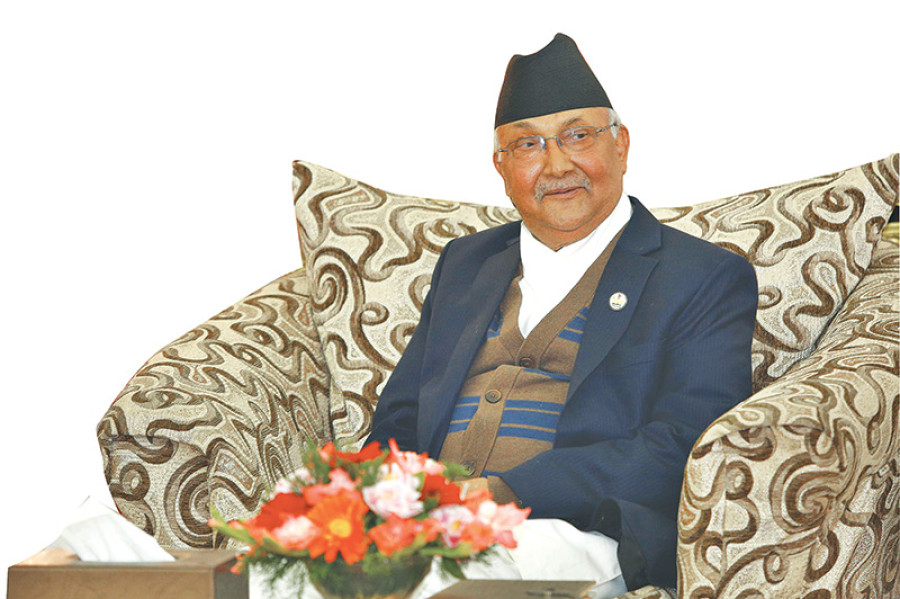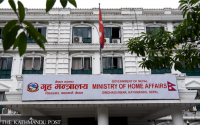National
Govt assigns PMO all-out authority
In a move unprecedented in the history of Prime Minister’s Office, the KP Sharma Oli-led government has assigned the PMO sweeping powers compared to past arrangements.
Anil Giri & Mukul Humagain
In a move unprecedented in the history of Prime Minister’s Office, the KP Sharma Oli-led government has assigned the PMO sweeping powers compared to past arrangements.
According to the business rules endorsed last week, the PMO will be more involved in the issues of foreign policy, national security and financial and economic crimes.
With the changes, the PMO will not only receive information and coordinate on political, economic, social, administrative, diplomatic and national security matters but also intervene whenever necessary. In the past, the PMO only took updates and monitored the issues.
The PMO has got the authority of corruption control by developing standards to regulate non-government organisations (NGOs). Earlier, the Ministry of Women, Children and Social Welfare handled NGO issues.
Three major departments—National Investigation Department (NID), the Department of Revenue Investigation (DRI) and the Department of Money Laundering Investigation (DMLI), which were under various ministries earlier, have also been brought under the purview of the PMO.
Clause 2 of the new business rules says the PMO generally directs, controls and conducts Nepal’s governance system. This clause is a new addition.
The PMO has also proposed forming several expert groups and think tanks related to economy, finance, foreign affairs, security and administrative matters, among others.
The new business rules, according to government officials, were introduced to enhance the PMO’s performance, making it a “centre of excellence” whose restructuring is currently under way.
Government sources said that the powerful NID, DRI and DMLI had failed to serve their purposes. “The new move is aimed at making these vital departments accountable and result-oriented,” said the source. Earlier, these departments were accountable to particular ministries. The PMO will now directly supervise them, monitor their tasks and issue instructions as required.
There were calls in the past to bring the intelligence department under the PMO. “Intelligence bodies and the foreign policy apparatus directly work under the PMO or the executive in several countries. We are exercising the same model here,” said a PMO official.
“In a bid to revamp the PMO, several initiatives have been taken. This is just a beginning,” said a secretary at the PM’s Office. Officials said they are studying the working modalities of the PMOs/President’s Offices in the United States, Malaysia, Australia, Singapore, India and China and the way executive powers are exercised there.
The rationale behind bringing the DMLI and the DRI under the PMO, according to officials, is to make them effective. The DMLI has been hit by frequent changes of its director general while the DRI has also failed often to control revenue leakage. “The DRI only watched traders and businessmen for revenue leakage but did not take action against employees held responsible for revenue losses,” the official said.
Experts “cautiously welcome” the move, wondering if the PMO is capable of handling all these critical affairs with efficacy. They also suspect if the changes merely reflect PM Oli’s “desire” to lead a strong office.
According to experts, the PMO will enjoy residual powers for the first time since the abolition of monarchy. “The monarchy used to exercise such residual power,” said Kashi Raj Dahal, chairman of the Administrative Court. “It now rests on the PMO.”
Former finance secretary Rameshore Khanal said the move to bring the DRI and the DMLI under the PMO is good in principle but its effectiveness depends largely on the PM’s Office and the prime minister himself.
“The new move could work well provided that Acts related to the Department of Revenue Investigation and the Department of Money Laundering Investigation are amended and these agencies given autonomy like the Nepal Rastra Bank,” said Khanal. “These agencies should be free of political intervention, which means even if the PM asks for the details of ongoing probe, there should be provisions for them to turn down such requests.”
“During my tenure too, there was discussion of detaching the Department of Revenue Investigation from the Finance Ministry,” said Khanal. This was for ending the practice of the same set of officials working at the DRI and the Inland Revenue Department, at the cost of effective investigation into revenue leakage and curbing financial crimes.
Power packed
PMO will be proactive in matters related to foreign policy, national security and financial crimes
Three departments—National Investigation Department, Department of Revenue Investigation and Department of Money Laundering Investigation—brought under the PMO
PMO to develop standards to regulate non-government organisations




 8.99°C Kathmandu
8.99°C Kathmandu















